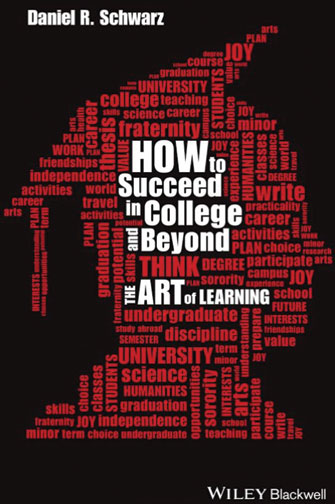How to Succeed in College and Beyond: The Art of Learning by Daniel R. Schwarz ’65 AM, ’68 PhD (Wiley Blackwell)

American higher education is under fire as never before. More than a dozen states have passed legislation rewarding public colleges for channeling students to STEM careers, while those same legislators cut funding for liberal arts. A chorus of critics is asking if college is even necessary in an age when online courses abound.
To guide parents of high school and college students and to defend the humanities, Daniel R. Schwarz ’68 AM, PhD ’68, the Frederic J. Whiton Professor of English at Cornell, who’s been teaching there for almost fifty years, published How to Succeed In College and Beyond: The Art of Learning. David L. Marcus ’82, author of Acceptance: A Legendary Guidance Counselor Helps Seven Kids Find the Right Colleges—And Find Themselves, asked him about his book.
BAM How do we prepare our children for success in college?
SCHWARZ Students need to develop time management skills and disciplined study habits as early as middle school. Set aside times for study, with no TV or smart phone interfering. If possible, get a summer job that teaches you something.
BAM One of your chapter titles stirred my anxiety: “What to Do With a Bachelor of Arts in English.” What is the answer?
SCHWARZ I’ve found that English majors believe in education as an end, not merely as a stepping-stone on a career path. While they are idealists, they are not impractical. They go into journalism, publishing, teaching, law, consulting, and, not infrequently, medicine.
BAM On the other hand, quite a few experts question the value of one of today’s most popular majors, business.
SCHWARZ There’s no such thing as a bad major, so long as you learn to think creatively, to write precisely, to read insightfully, to speak articulately.
BAM What’s something that parents should know when they send a child to college?
SCHWARZ Your son or daughter is on campus as an individual, not as part of the family team. If you’ve overly managed your child’s high school career and gotten enmeshed in the admissions process, this is your chance to be encouraging without being overbearing. Let your student solve problems. Don’t try to intervene because the student down the hall has a bigger room. At college, it’s time for students to master the three Rs: resilience, resolve, and resourcefulness.
BAM We’ve all read about the economic value of a college education, but what about the value of a college education in non-economic or intangible terms?
SCHWARZ I emphasize what education can add to the student’s quality of life in terms of self-awareness, understanding of the past and present contexts that define our individual and community experience, and appreciation of the arts as a doorway to a fuller life.
BAM What’s your challenge to undergrads?
SCHWARZ To be open to rethinking their assumptions.




